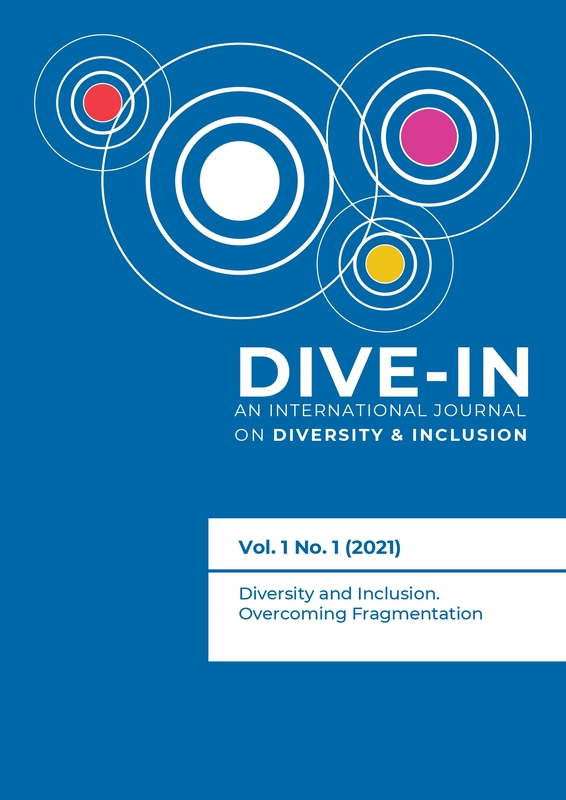Altérité, Diversité, Différence: Quelques jalons
DOI:
https://doi.org/10.6092/issn.2785-3233/13885Parole chiave:
barbarian, savage, diversity, difference, identityAbstract
L’énoncé du projet de recherche (Diversité et inclusion, vaincre la fragmentation) part d’une situation présente: comment allier diversité et inclusion, et comment, de ce fait, prévenir la fragmentation? Si les questions ont une dimension immédiatement pratique (comment faire?) et locale, elles renvoient aussi à tout un arrière-plan historique, philosophique, religieux, politique qui vient de loin dans l’histoire de l’Europe ou de ce qui est devenu l’Europe. C’est cet arrière-plan que je souhaiterais convoquer, en m’arrêtant sur quelques moments (par exemple, le lancement du couple Grecs/Barbares), sur la mise en place d’opérateurs à la fois conceptuels et politiques (par exemple, le sauvage du XVIe siècle devenant un primitif au XIXe siècle et, au XXe siècle, un habitant du monde sous-développé, puis en développement), en relevant certaines évolutions sémantiques (altérité, différence, diversité, racisé, sur fonds d’individualisme croissant), ainsi que l’apparition de nouveaux concepts ou, au moins, de nouveaux usages de ces concepts: tel l’identité, qui peut faire alliance avec la différence (le droit à ma différence), avec le développement (dès lors qu’il est conçu dans les anciennes colonies comme ‘endogène’) et avec le patrimoine (en allant du plus local à l’universel). Bref, marquer quelques repères et poser quelques jalons pour une histoire conceptuelle de longue durée des modalités du rapport de l’autre et du même.
Riferimenti bibliografici
Acosta, José de. 1984. De procuranda Indorum salute. Madrid: Consejo superior de Investigationes scientificas.
Césaire, Aimé. 2004. Discours sur le colonialisme (1950). Paris: présence africaine.
Coquery-Vidrovitch, Catherine. 2020. “Cheik Anta Diop et l’histoire africaine”. Le Débat 208. 178-190.
Dubreuil, Laurent. 2018. “Contre la politique d’identité”. Le Débat 202. 139-148.
Fabian, Johannes. 2006. Le temps et les autres. Comment l’anthropologie construit son objet. Transl. E. Henry-Bossomey & B. Müller. Toulouse: Anacharsis.
Gauchet, Marcel. 2017. L’avènement de la démocratie IV. Le nouveau monde. Paris: Gallimard.
Hartog, François. 2006. Anciens, modernes, sauvages. Paris: Points-Seuil.
Hartog, François. 2018. Partir pour la Grèce. Paris: Champs-Flammarion.
Koselleck, Reinhart. 2006. Le futur passé, Contribution à la sémantique des temps historiques. Paris: EHESS.
Lévi-Strauss, Claude. 1973a. “Les trois humanismes.” In Lévi-Strauss, Claude, Anthropologie structurale deux, 319-322. Paris: Plon.
Lévi-Strauss, Claude. 1973b. “Race et histoire.” In Lévi-Strauss, Claude, Anthropologie structurale deux, 377-422. Paris: Plon.
Lévi-Strauss, Claude. 1983. “Race et culture. ” In Lévi-Strauss, Claude, Le regard éloigné, 21-48. Paris: Plon.
Mastronardi, Severo. 2019. Un laboratoire pour l’étude des régimes d’historicité, Histoire et développement à l’Unesco 1945-1980. Paris: École des Hautes études en Sciences Sociales (Thèse doctorale).
Morgan, Lewis. 1971. La société archaïque. Trad. Halie Jaouiche. Paris: Anthropos.
Pagden, Anthony. 1982. The Fall of Natural Man. Cambridge: Cambridge University Press.
Roy, Olivier. 2019. L’Europe est-elle chrétienne?. Paris: Seuil.
Stocking, G.W. Jr. 1987. Victorian Anthropology. London: Free Press.
UNESCO. 2020. Textes fondamentaux. Édition révisée comprenant les textes et amendements adoptés par la Conférence générale à sa 40e session (Paris, 12-27 novembre 2019). Paris: UNESCO. (https://unesdoc.unesco.org/ark:/48223/pf0000372956_fre/PDF/372956fre.pdf.multi.page=6)
Whittaker, Charles R. 1989. Les frontières de l’Empire romain. Trad. Christian Goudineau & Christine Castelnau. Besançon: Annales littéraires de l’Université de Besançon.
Wolff, Francis. 2017. Trois utopies contemporaines. Paris: Fayard.
Downloads
Pubblicato
Come citare
Fascicolo
Sezione
Licenza
Copyright (c) 2021 François Hartog

Questo lavoro è fornito con la licenza Creative Commons Attribuzione 4.0 Internazionale.





